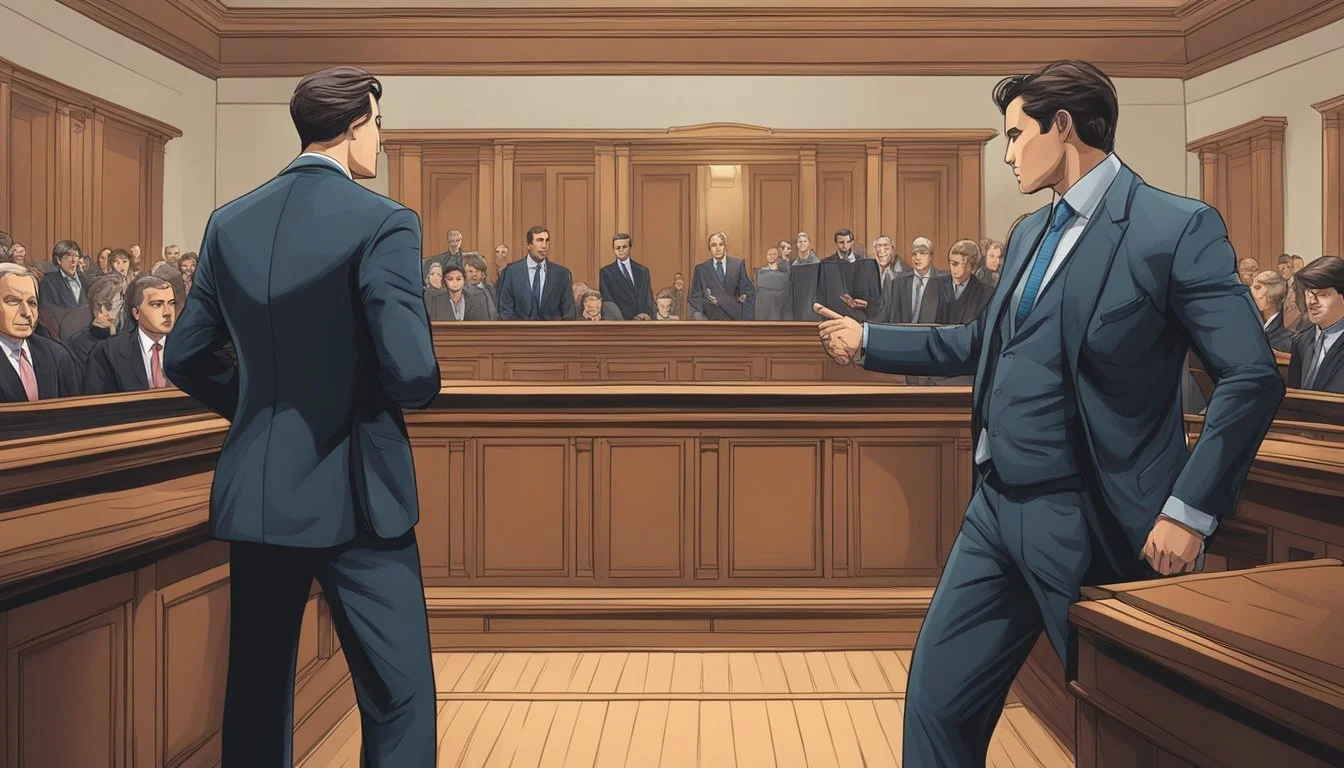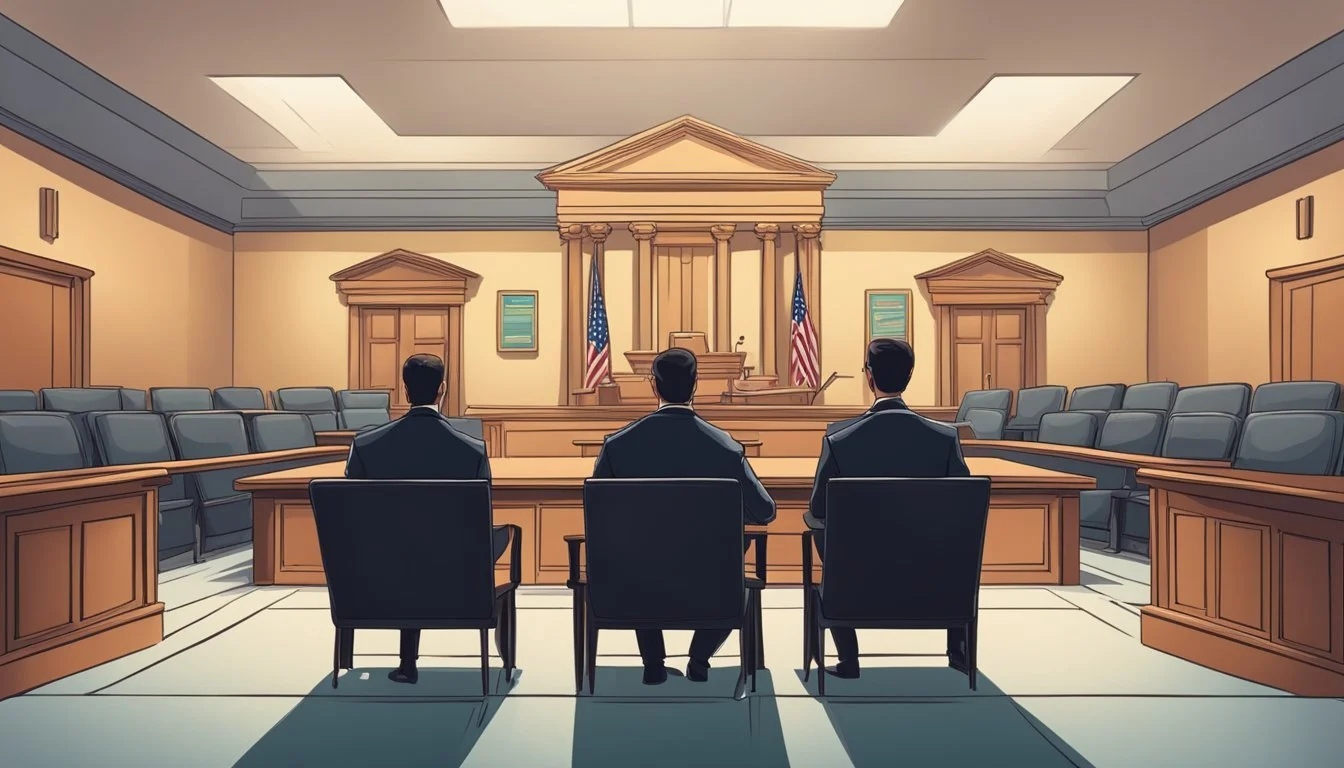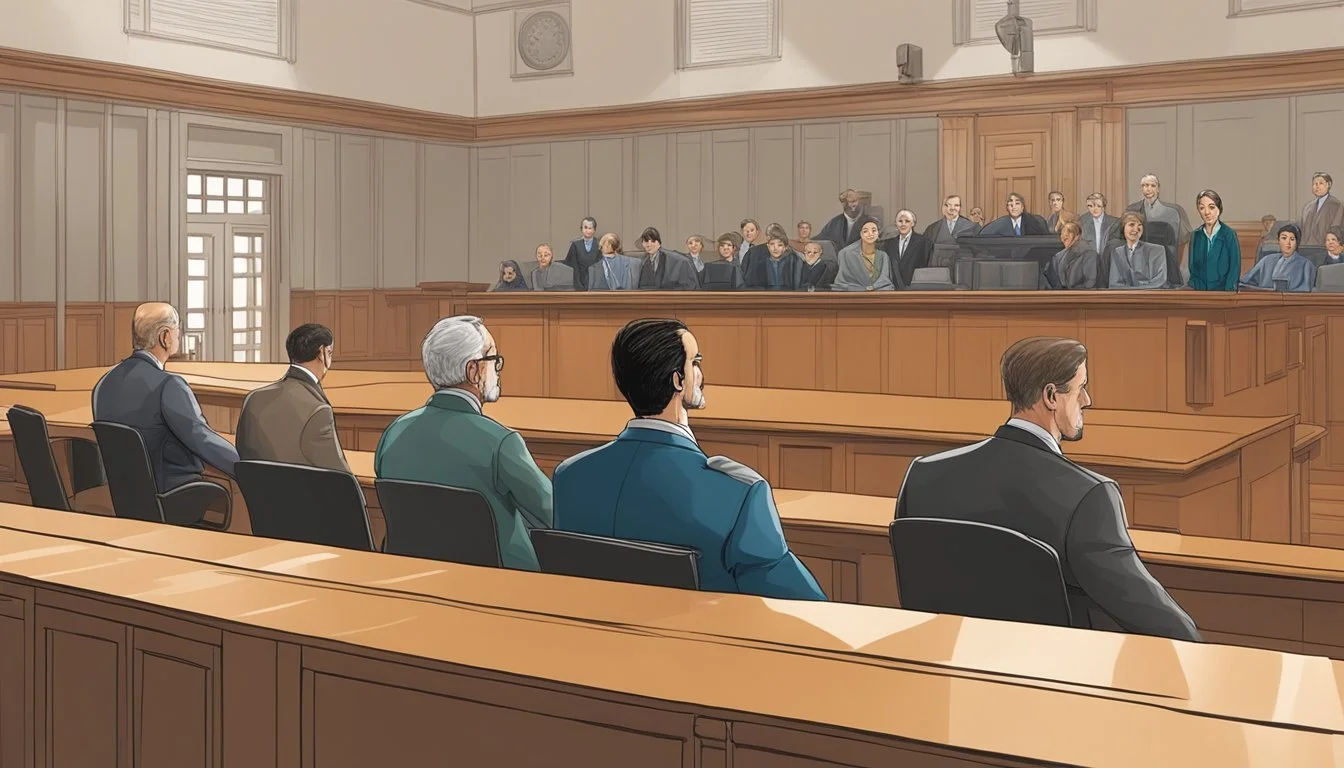Victims or Villains: The Blurred Lines in the Menendez Brothers' Case
Examining the Complex Moral Landscape
The Menendez brothers case continues to captivate public attention decades after the 1989 murders of their parents. This high-profile case sparked intense media coverage and debate over whether Lyle and Erik Menendez were cold-blooded killers or victims of abuse driven to extreme measures.
The complex narrative surrounding the Menendez brothers blurs the lines between victims and villains, challenging simplistic categorizations. Their claims of suffering long-term sexual abuse at the hands of their father added layers of complexity to the case. The brothers' defense team argued this abuse led to the killings, while prosecutors portrayed them as greedy murderers after their parents' wealth.
The media frenzy surrounding the case significantly influenced public perception. Extensive coverage of the trials, including televised proceedings, turned the Menendez brothers into household names. This intense scrutiny continues today, with new documentaries and renewed public interest examining the case from fresh perspectives and reevaluating the brothers' claims of abuse.
Historical Context
The Menendez brothers' case unfolded in the affluent setting of Beverly Hills, California. In 1989, Jose and Kitty Menendez were brutally murdered in their mansion, sending shockwaves through the community.
Jose Menendez was a successful entertainment executive, while Kitty was a socialite. The family's wealth and status added to the public's fascination with the case.
Lyle and Erik Menendez, the couple's sons, initially appeared to be grieving heirs. However, their lavish spending spree following their parents' deaths raised suspicions.
The late 1980s and early 1990s saw a surge in true crime media coverage. High-profile cases like the Menendez brothers' trial captivated audiences nationwide.
The brothers' defense strategy, which included allegations of abuse, sparked debates about family dynamics and mental health. This approach challenged societal perceptions of victimhood and criminality.
Media coverage of the trial was extensive, with courtroom proceedings televised. This level of exposure influenced public opinion and legal discourse surrounding the case.
The Menendez brothers' trial occurred during a period of evolving attitudes towards domestic abuse and its psychological impacts. This context played a crucial role in shaping the legal arguments and public reactions to the case.
The Crimes and Convictions
The Menendez brothers' case shocked the nation with its brutal violence and complex legal proceedings. Their actions and subsequent trials raised questions about justice, family dynamics, and the criminal justice system.
Overview of the Murders
On August 20, 1989, Lyle and Erik Menendez shot their parents, Jose and Kitty Menendez, in their Beverly Hills mansion. The brothers used shotguns to kill their father and mother, firing multiple times at close range.
Initially, the brothers claimed they were not home during the murders. They spent lavishly in the months following their parents' deaths, raising suspicions.
The police investigation eventually led to their arrest in March 1990, after a therapist came forward with information about the brothers' confessions.
Trial Proceedings
The Menendez brothers' trial began in 1993. It gained significant media attention due to the brutality of the crimes and the family's wealth.
The prosecution argued the murders were motivated by greed and the brothers' desire to inherit their parents' fortune.
The defense claimed the brothers acted in self-defense after years of physical and sexual abuse by their father.
The first trial ended in hung juries for both brothers. A second trial began in 1995, with stricter rules on admissible evidence.
Life Sentences and Aftermath
In 1996, both Lyle and Erik Menendez were convicted of two counts of first-degree murder and conspiracy to commit murder.
The jury rejected their claims of abuse and self-defense. The brothers were sentenced to life in prison without the possibility of parole.
They have been serving their sentences in separate California prisons since their convictions. Their case continues to spark debate about familial abuse, justice, and the complexities of criminal motivations.
Key Figures and Legal Representation
The Menendez brothers' case featured prominent attorneys on both sides. These legal professionals played crucial roles in shaping the trial's narrative and outcome.
Prosecution: Pamela Bozanich
Pamela Bozanich led the prosecution against Lyle and Erik Menendez. As the deputy district attorney for Los Angeles County, she presented a compelling case portraying the brothers as cold-blooded killers motivated by greed.
Bozanich argued that the Menendez brothers murdered their parents to inherit their fortune. She meticulously presented evidence of the brothers' lavish spending after the killings.
Her strategy focused on dismantling the defense's abuse claims. Bozanich painted the defendants as manipulative and unremorseful, aiming to secure first-degree murder convictions.
Defense: Leslie Abramson and Mark Geragos
Leslie Abramson served as the lead defense attorney for Erik Menendez. Known for her fierce courtroom presence, Abramson built a defense centered on allegations of long-term sexual and emotional abuse by the parents.
Mark Geragos joined the defense team for the retrial. His involvement brought additional media attention to the case. Geragos and Abramson worked to portray the brothers as victims of severe abuse.
The defense team introduced expert testimony on the psychological effects of abuse. They argued that the killings were an act of self-defense, stemming from years of trauma and fear.
Defense Narratives and Evidence
The Menendez brothers' defense strategy centered on allegations of abuse and claims of self-defense. Their legal team presented controversial narratives and introduced new evidence to support their case.
Allegations of Sexual Abuse
Lyle and Erik Menendez claimed they had suffered years of sexual abuse at the hands of their father, Jose Menendez. Their defense attorneys argued this abuse led to severe psychological trauma, influencing their actions on the night of the murders.
The brothers testified about specific instances of molestation and described a household environment of fear and manipulation. Their accounts were met with skepticism by prosecutors, who portrayed them as fabrications to avoid murder convictions.
Expert witnesses were called to testify about the effects of long-term sexual abuse on victims' mental states. The defense aimed to establish a link between the alleged abuse and the brothers' violent actions.
Self-Defense Claims
The defense team argued that Lyle and Erik Menendez killed their parents in self-defense, fearing for their lives. They claimed the brothers believed their parents would kill them to prevent the exposure of the alleged sexual abuse.
Attorneys presented evidence of the brothers' psychological state, including testimony from mental health professionals. They argued that years of abuse had created a mindset of constant danger and vulnerability.
The prosecution countered these claims, pointing to the brothers' actions after the murders as inconsistent with self-defense. They highlighted the lavish spending and seemingly carefree behavior following their parents' deaths.
Introduction of New Evidence
In recent years, the Menendez brothers' legal team has introduced new evidence to support their original defense claims. This includes a letter allegedly written by Erik Menendez, detailing instances of abuse.
The defense has also presented testimony from family members who claim to have witnessed signs of abuse. These new accounts aim to corroborate the brothers' original allegations and potentially influence future legal proceedings.
Prosecutors have challenged the admissibility and relevance of this new evidence. The ongoing debate surrounding these new elements highlights the complex nature of the case and its lasting impact on the legal system.
Media Influence and Public Opinion
The Menendez brothers' case captivated the public through intense media coverage and evolving forms of true crime entertainment. News outlets, talk shows, and social media platforms shaped perceptions of the brothers and their alleged abuse.
Coverage by News and Talk Shows
Major news networks provided extensive coverage of the Menendez trials, broadcasting courtroom proceedings and expert analyses. Talk shows featured interviews with key figures, including family members and legal experts. This constant media attention kept the case in the public eye for years.
Newspapers and magazines published in-depth articles examining the brothers' background, family dynamics, and conflicting theories about the murders. The media often framed the case as a sensational tale of wealth, privilege, and alleged patricide.
Some outlets focused on the brothers' claims of abuse, while others emphasized the brutality of the killings. This varied coverage contributed to divided public opinions on whether the Menendez brothers were victims or cold-blooded killers.
The Rise of True Crime Entertainment
The Menendez case played a significant role in popularizing true crime content. Television networks produced multiple documentaries and dramatized retellings of the murders and trials. These programs often delved into the psychological aspects of the case, exploring possible motives and family history.
Books written by journalists and legal professionals offered detailed accounts of the events, further fueling public fascination. The case became a staple of true crime literature and podcasts, with new interpretations emerging over the years.
This surge in true crime entertainment surrounding the Menendez brothers influenced how similar cases were portrayed in media, setting a template for in-depth exploration of high-profile crimes.
Impact of Social Media Narratives
Social media platforms have reignited interest in the Menendez case decades after the trials. TikTok users have created viral content discussing the brothers' claims of abuse and questioning the fairness of their sentences.
Online communities debate the case, sharing information and theories. This digital discourse has led to renewed calls for a reexamination of the evidence and potential resentencing.
Social media has allowed younger generations to engage with the case, often viewing it through a more sympathetic lens towards the brothers' abuse claims. This shift in perspective demonstrates how evolving societal attitudes can influence public opinion on past legal cases.
Cultural Depictions and Dramatizations
The Menendez brothers case has been portrayed extensively in popular media. Television shows, films, books, and documentaries have explored the complex story from various angles, offering different interpretations of the events and the brothers' motivations.
Television and Film Portrayals
Several TV series and movies have dramatized the Menendez case. In 2017, "Law & Order True Crime: The Menendez Murders" aired on NBC, starring Edie Falco as defense attorney Leslie Abramson. The show provided a detailed look at the legal proceedings and family dynamics.
Ryan Murphy's "American Crime Story" anthology series tackled the case in its third season, titled "Monsters: The Lyle and Erik Menendez Story." This 2024 Netflix production delved into the brothers' troubled upbringing and the events leading to the murders.
In March 2024, Fox Nation released "Menendez Brothers: Victims or Villains," a miniseries that aimed to present both sides of the story. It featured interviews and courtroom drama, encouraging viewers to form their own opinions on the case.
Literary and Documentary Interpretations
Numerous books have been written about the Menendez brothers, ranging from true crime accounts to psychological analyses. Robert Rand's "The Menendez Murders: The Shocking Untold Story of the Menendez Family and the Killings That Stunned the Nation" provided an in-depth look at the case.
Documentaries have also played a significant role in shaping public perception. ABC's "Truth and Lies: The Menendez Brothers" (2017) featured interviews with Lyle Menendez and key figures from the trials. The 2018 Oxygen documentary "Menendez Brothers: The Sins of the Children" explored the impact of childhood trauma on the brothers' actions.
These works have contributed to ongoing discussions about the complexities of the case, often blurring the lines between victims and villains in the public eye.
Contemporary Views and Discussions
The Menendez brothers' case continues to spark debate and reexamination decades after the verdict. New media portrayals and social movements have shifted public perception, while legal and psychological experts reassess the complexities of the case.
Retrospective Analyses
Recent true crime series like "Monsters: The Lyle and Erik Menendez Story" have reignited interest in the case. These productions often present a more sympathetic view of the brothers, exploring potential abuse and trauma.
Social media platforms have become hubs for discussions about the case. Many young people express support for the Menendez brothers, viewing them as victims rather than perpetrators.
The "Impact x Nightline" documentary further fueled public discourse by presenting new perspectives on the brothers' motivations and backgrounds.
Criminal Justice Perspectives
Legal experts continue to debate the fairness of the original trial and sentencing. Some argue that contemporary understanding of trauma and abuse should warrant a reevaluation of the case.
The Los Angeles County district attorney's office is currently reviewing new evidence related to the brothers' claims of abuse.
Critics question whether the intense media coverage during the original trial influenced the jury and public opinion unfairly.
Psychological and Societal Implications
Mental health professionals now emphasize the long-term effects of childhood trauma and abuse in cases like the Menendez brothers'.
The case raises questions about the intersection of victimhood and criminality, challenging binary views of perpetrators and victims.
Societal attitudes towards discussing male sexual abuse have evolved, potentially affecting how the brothers' claims are perceived today.
The ongoing debate surrounding this case reflects broader discussions about criminal justice reform and the treatment of trauma in legal proceedings.
Influential Commentary and Reactions
The Menendez brothers case has sparked extensive commentary from various public figures and legal experts. These reactions have shaped public perception and legal discourse surrounding the case.
Comments from High-Profile Celebrities
Rosie O'Donnell has been a vocal advocate for the Menendez brothers, arguing for their release. She has used her platform to highlight their claims of abuse and call for a reevaluation of their case.
Adam Carolla and Darrell Hammond have addressed the case in their comedy routines, often taking a more skeptical stance towards the brothers' claims. Their commentary has influenced public opinion, particularly among their fan bases.
A recent Netflix series dramatizing the case has reignited public interest. The show's portrayal has been criticized by Erik Menendez for containing "blatant lies" about their story.
Legal Expert Opinions
Many legal experts have weighed in on the complexities of the Menendez case. Some argue that the brothers' history of abuse should have been given more consideration during their trial.
Others maintain that the premeditated nature of the crime justifies the life sentences. The debate often centers on the balance between justice for the victims and understanding the impact of childhood trauma.
Several docuseries have featured interviews with legal professionals, providing in-depth analysis of the trial proceedings and subsequent appeals. These experts often disagree on the appropriate sentencing for cases involving abuse claims.





